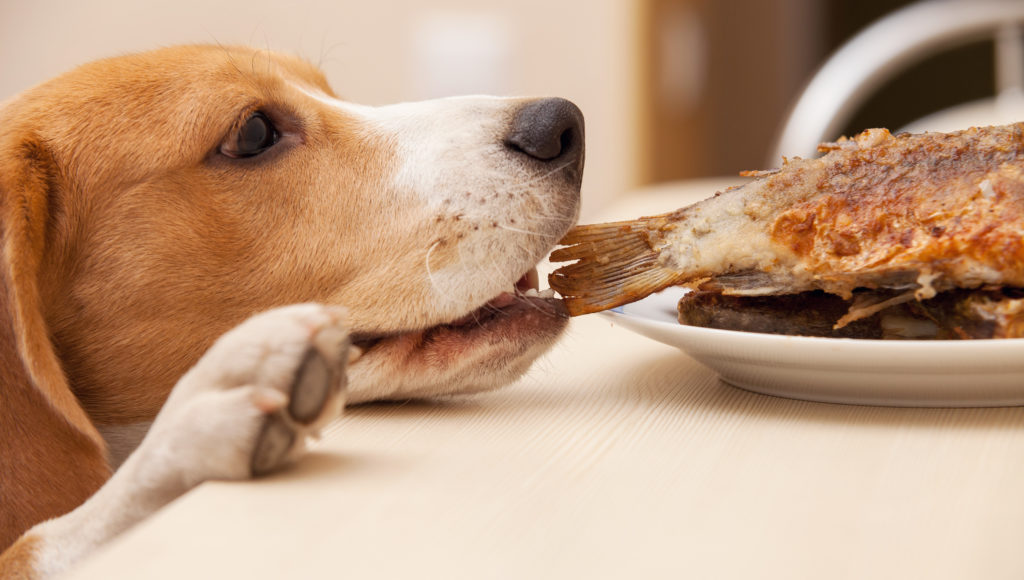WE COVER THE INCREDIBLY IMPORTANT, AND OFTEN OVERLOOKED, TOPIC OF HUMAN FOODS THAT ARE DANGEROUS FOR YOUR DOG, AS WELL AS SOME DOG-FRIENDLY FOODS YOU CAN GIVE THEM
Dogs are not picky, and they also are often determined when it comes to investigating and finding food in places like rubbish bins. So it is important that we keep rubbish bins out of the reach of our dogs and responsibly dispose of food. We also need to be aware of items on the ground when out and about, that often wild animals (or careless, thoughtless humans) can leave strewn across the street and grassy areas. However, often our pets end up having foods because we “kindly” feed them a little bit here and there, or we drop some without picking it up and they scavenge.
A couple of bits of advice to start with: before you feed your dog any human food, look it up to check whether it is considered safe for dogs. If you’re not sure still, err on the side of caution. And also, remember that while our pets may beg and do puppy eyes when we have a plate of our food or we are cooking, dogs don’t measure love in the exact foods we give them. They don’t consider chocolate high value to them just because it is a reward for us as humans and they won’t hate you if you deny them that bit of human food. Also remember that dogs have different digestive systems to humans and most dogs have a lactose intolerance so what is a treat for us as humans (e.g. ice cream) can just end up making your pup feel under the weather.
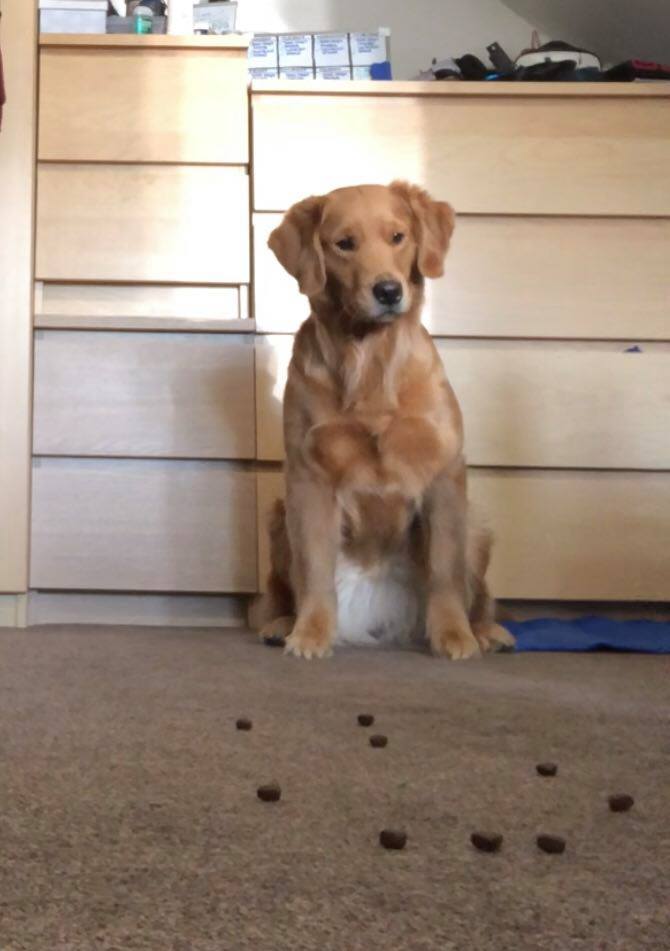
Teach your dog a “leave it” and “drop it” command and reinforce these frequently. “Leave it” indicates they should not take something and a successful leave it should be strongly rewarded with praise and an alternative treat while you pick up whatever it was. “Drop it” indicates that your dog should let go of whatever they have in their mouth – this can seem like a challenging prospect but it can be taught, especially with the “exchange” concept, where your dog trades you the item they have for a better one (keep your super high value dog-safe treats for these occasions). You can start by practising these with a ball or similar toy during play and work up to food based items. Check out this good in-depth guide to teaching these commands. General impulse control is a valuable skill for dogs to have as well so it is definitely worth working on this.
DANGEROUS TO DOGS
If you are ever concerned about your dog having consumed one of the foods below – contact a vet (usually calling them is a good first step, especially if your pup is not symptomatic). Note the item they have eaten and quantity if possible, as well as how long ago (again, if possible) and inform the vet, then follow their instructions. If you take them to a vet, bring a sample of the item they digested (with packaging) if possible. This will help the vet identify any dangerous ingredients you might not recognise.
URGENT
Xylitol (found in sweetener, chewing gum, sugar free products, SOME PEANUT BUTTERS)
Xylitol-containing products can cause a range of potentially very severe health problems (including death) as a result of excessive insulin release in response, therefore if your dog consumes something containing xylitol CONTACT YOUR VET URGENTLY. If in doubt or you’re not sure when they consumed it, take them to the emergency vet IMMEDIATELY (with a sample of the item & packaging if possible). Time is key with this, given the rapid effects of the chemical once it leaves the stomach. The toxic dose is considered to be as little as 0.1g xylitol per kg of dog’s bodyweight. Note: xylitol consumption in any quantity is a potential emergency situation so contact your vet.
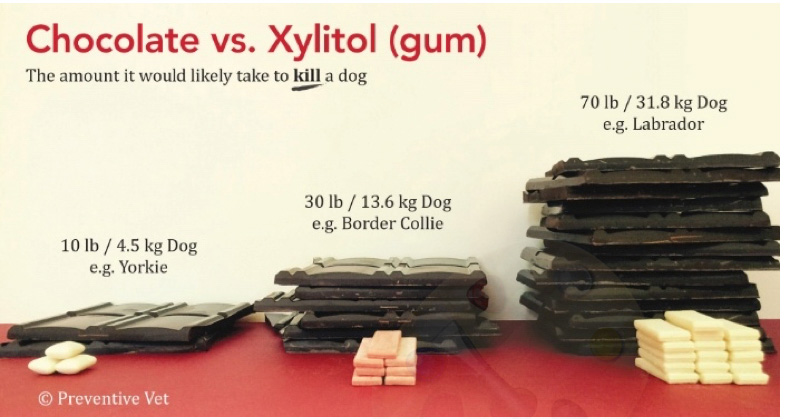
Chocolate
This is generally widely known to be bad for dogs. It is actually due to the stimulant found in it (theobromine) which can cause poisoning in dogs. The amount of this varies between types of chocolate, with dark chocolate containing the most, but you are best off never giving your dog chocolate as it can cause kidney failure.
TOXIC
These foods are toxic and potentially fatal to dogs – do not feed them to your pets, pick up any that you drop and keep them out of reach. Remember dogs can be very determined and sneaky, so what is out of reach for a toddler on a counter top or shelf is not necessarily out of reach for a determined, hungry dog (especially a large one!)
- Grapes & raisins – there is no “safe” dose of grapes or raisins as it varies significantly from dog to dog as to how severely it could affect them, but they can cause severe liver damage & kidney failure in some dogs. Raisins, currants and sultanas are thought to be worse than fresh grapes, and this includes products containing these dried fruits (e.g. mince pies, hot cross buns, fruitcake etc.) It isn’t known what causes the negative effects in dogs, so it isn’t possible to determine which dogs will be more sensitive or worse affected (quantity ingested doesn’t clearly correlate with size of dog when it comes to the extent of poisoning).
- Onions, garlic & chives – can cause delayed reaction which affects the gastrointestinal system and red blood cell damage – the danger here is the delay of the reaction, you may not know they’re unwell from this for a good 24-48 hours. Avoid feeding your dog items which contain any of these, in case.
- Macadamia nuts & walnuts – effects can start within 12 hours of consumption can affect your dog’s nervous system & muscles, causing weakness, tremors, vomiting etc.
- Corn on the cob – the cob can cause a blockage in your dog’s intestine, so make sure to keep these well out of your dog’s reach and put them directly into a bin that the dog cannot access (however determined they are). Also excessive consumption of the corn can cause discomfort as it isn’t fully digested.
- Alcohol – this has a similar impact on animals as it does on humans – as a depressant, it causes decreased coordination, central nervous system depression, and can result in difficulty breathing, coma & death. Do not feed alcohol containing foods to animals either.
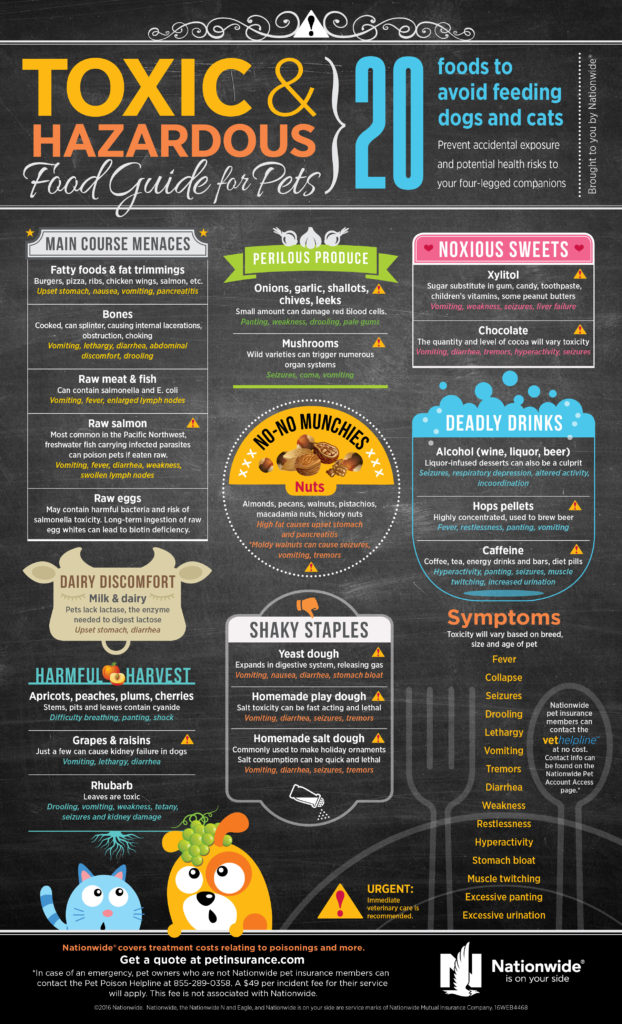
Disclaimer: the above infographic is guidance only. The raw meat, fish & eggs section is a controversial one – in many cases this is fine, it is about being aware of the risks, making sure you’re doing things right and using quality produce. For guidance about raw feeding check out the BARF UK group.
DANGEROUS
- Cooked bones – splinter easily and can cause an obstruction or perforation of the gut. If you choose to, stick to raw, uncooked bones – and still make sure to supervise these as some can also splinter (e.g. deer legs). Generally feeding raw bones, even safe ones (e.g. soft, non-weight-bearing bones) has the potential to cause digestive upset if you don’t already feed your dog a raw diet. Refer to the BARF UK group for raw feeding advice.
- Avocado (all parts) – can cause vomiting & diarrhoea, make sure to dispose of the seed safely where your dog can’t access it.
- Stone fruits (e.g. cherries, apricots, peaches, plums) – the stones/pits contain cyanide which can cause cyanide poisoning (difficulty breathing and shock). Make sure to dispose of the stones and pits safely where your dog can’t access them.
- Raw yeast bread dough – the dough rises in their digestive system, resulting in excessive gas and potential blockage or twisting the stomach (a life-threatening emergency).
- High caffeine content food & drink (especially concentrated products like tea bags & coffee beans) – they can cause excessive thirst & urination, abnormal heart rhythm, vomiting & diarrhoea, and even seizure and death.
- High salt content foods – these cause excessive thirst & urination, and can result in vomiting, diarrhoea, depression, seizures & even death.
- High fat foods – these can cause nausea, digestive upset, vomiting and even pancreatitis, as well as weight (and fat) gain.
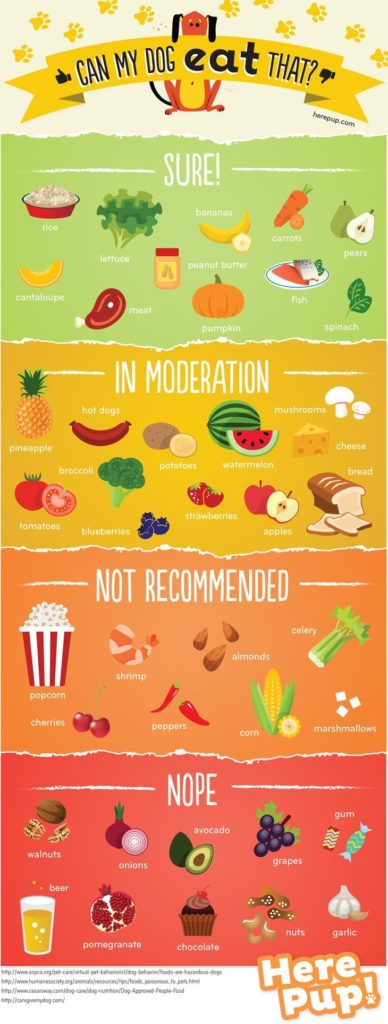
GENERALLY DOG-SAFE
The following foods are generally considered to be safe for dogs to eat. If they have not eaten it before, try it in very small amounts to check they can tolerate it without digestive upset or intolerance.
- Plain cooked meat (without sauces, seasonings etc.)
- Peanut butter (natural, dog-specific or brands which don’t contain xylitol, palm oil – see list below) – but limit as a treat due to high fat & sugar content
- Carrots, green beans, green peas, broccoli, sweet potato, store-bought plain mushrooms
- Cooked eggs (some also feed raw eggs – if feeding the shell of raw eggs, make sure to crush it up as it can cause obstruction or cut the digestive tract if large and sharp pieces remain, and make sure to maintain good hygiene with raw eggs to avoid salmonella poisoning – see BARF UK link below)
- Cooked, boneless salmon (be vigilant about bones as they are a choking hazard)
- Blueberries, watermelon, apple (avoiding the seeds/pips and rind of watermelon)
- Pineapple, mango, banana (in moderate amounts)
- Cottage cheese (in small quantities)
- Cooked rice & plain cooked potato (in moderate amounts due to high starch content)
Even though these foods are considered safe, avoid feeding them in excess as they can often cause digestive upset, and always break them up small to make sure they are not a choking hazard.
Examples of dog-safe brands of peanut butter commonly available in the UK:
- Peamutt Butter – specifically for dogs
- Sun Pat
- Whole Earth
**information sources**
Vets Now: Foods Poisonous to Dogs
Xylitol Containing Products & Dogs
Battersea: Toxic Foods for Dogs
ASPCA: Animal Poison Control
AKC: Human Foods Your Dog Can & Can’t Eat
Dog-Safe Human Foods
Here Pup
Toxic & Hazardous Food Guide
Can Dogs Eat Peanut Butter
BARF UK Group – Raw Feeding Advice


